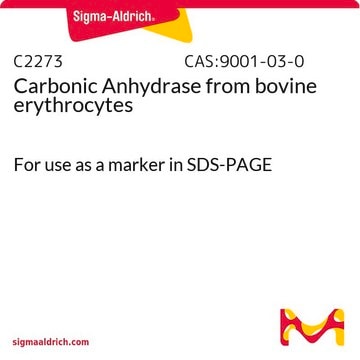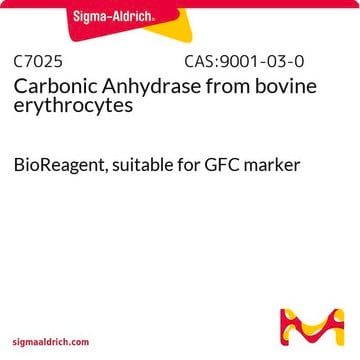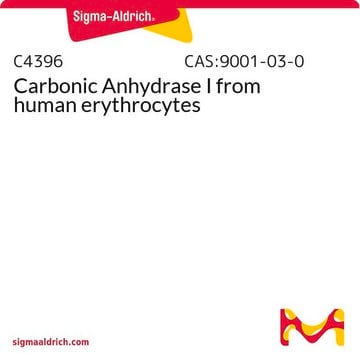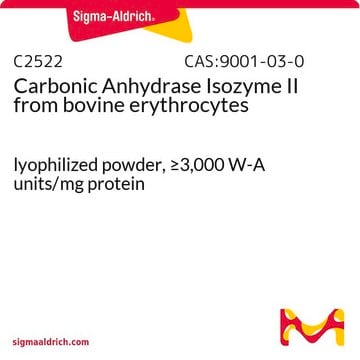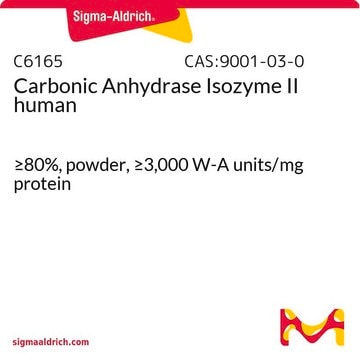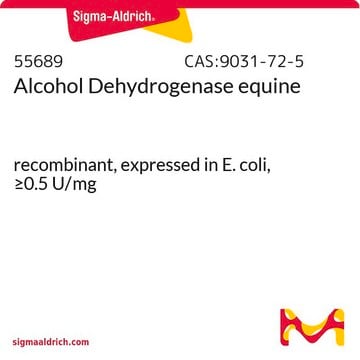C5024
Carbonic Anhydrase from bovine erythrocytes
non-denaturing PAGE marker
Synonym(s):
Carbonate Dehydratase, Carbonate Hydrolyase
Sign Into View Organizational & Contract Pricing
All Photos(1)
About This Item
Recommended Products
Quality Level
form
lyophilized powder
mol wt
~29 kDa
suitability
suitable for marker for electrophoresis (non-denaturing PAGE)
storage temp.
−20°C
Looking for similar products? Visit Product Comparison Guide
Application
This product is used as a marker to determine the molecular mass of an unknown protein in non-denaturing electrophoresis systems. In such systems, proteins often retain their biological activity, thus allowing in-gel detection using specific substrate stains. This technique also facilitates the recovery of the active protein. The product yields 3 bands.
Reconstitution
0.9-1.4 mg/mL after reconstitution with 1 mL of water
Signal Word
Danger
Hazard Statements
Precautionary Statements
Hazard Classifications
Resp. Sens. 1
Storage Class Code
11 - Combustible Solids
WGK
WGK 3
Flash Point(F)
Not applicable
Flash Point(C)
Not applicable
Personal Protective Equipment
dust mask type N95 (US), Eyeshields, Gloves
Choose from one of the most recent versions:
Certificates of Analysis (COA)
Lot/Batch Number
Don't see the Right Version?
If you require a particular version, you can look up a specific certificate by the Lot or Batch number.
Already Own This Product?
Find documentation for the products that you have recently purchased in the Document Library.
Customers Also Viewed
Wolfgang Maret
Advances in nutrition (Bethesda, Md.), 4(1), 82-91 (2013-01-16)
The nutritional essentiality of zinc for the growth of living organisms had been recognized long before zinc biochemistry began with the discovery of zinc in carbonic anhydrase in 1939. Painstaking analytical work then demonstrated the presence of zinc as a
Romualdo Talento et al.
Ultrastructural pathology, 37(1), 70-76 (2013-02-07)
Despite progress in the classification of renal cell carcinomas (RCC), a subset of these carcinomas remains unclassified (RCC-U). Patients with RCC-U usually present at a late stage and have a poor prognosis. Several studies have attempted to extract new classifications
Peter Burghout et al.
Journal of bacteriology, 195(7), 1573-1582 (2013-01-29)
Although carbon dioxide (CO2) is known to be essential for Streptococcus pneumoniae growth, it is poorly understood how this respiratory tract pathogen adapts to the large changes in environmental CO2 levels it encounters during transmission, host colonization, and disease. To
Xiuhong Shan et al.
Journal of computer assisted tomography, 37(1), 22-28 (2013-01-17)
The objective of this study was to investigate the correlation between the degree of necrosis displayed in computed tomography (CT) image and the expression of hypoxic and angiogenesis biomarkers of breast cancer. Forty-four breast cancer cases were examined with CT
Bernardo V Alvarez et al.
BMC cardiovascular disorders, 13, 2-2 (2013-01-10)
Carbonic anhydrase enzymes (CA) catalyze the reversible hydration of carbon dioxide to bicarbonate in mammalian cells. Trans-membrane transport of CA-produced bicarbonate contributes significantly to cellular pH regulation. A body of evidence implicates pH-regulatory processes in the hypertrophic growth pathway characteristic
Our team of scientists has experience in all areas of research including Life Science, Material Science, Chemical Synthesis, Chromatography, Analytical and many others.
Contact Technical Service
